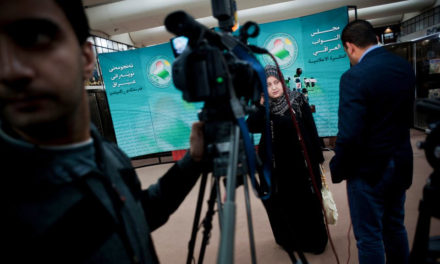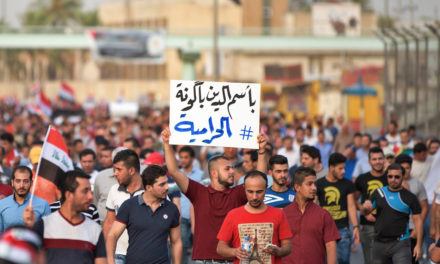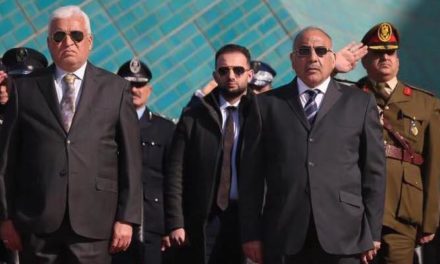(Photo: Rodi Said/Reuters)
Until now, there are no accurate statistics on the number of children that have been recruited by Da’ish. Some reports confirm that their number is no less than 5,000 children, many of whom were born of foreign parents coming to fight for Da’ish in Syria and Iraq, while other reports suggest that more than 41,000 foreign citizens joined Da’ish and parented many children. Following this strategy, Da’ish was trying to create a multinational Muslim society with extremist ideologies.
When Da’ish occupied Mosul in 2014, its members kept in mind the importance of generating time bombs that the opponents of Da’ish would not be able to easily handle. Thus, Da’ish used victims from Yazidi and Turkmens families who were abducted, trying to brainwash their women and children to serve the purposes of the so-called Islamic State. To achieve this aim, Da’ish was executing a particular educational and cultural system to add these enslaved individuals to the army of their Caliphate.
Converting all those children into new members in the fight Da’ish waged was an attempt through which they wanted to spread horror throughout the world. Da’ish was keen to use those children in propaganda activities and videos showing them during beheading spectacles of innocent people. As such, Da’ish wanted to send a clear message to the international community: there would be a new generation of terrorists the world had never seen before.
Other children under the shackles of Da’ish were subjected to bad treatment, sexual abuse, and physical violence. Da’ish isolated them in special camps in order to separate them from normal life, which remains one of the most dangerous factors impacting the future of these victims. How they interact with the others with whom they do not share the same religious beliefs going forward remains to be seen.
A boy who had lived under Da’ish stated that terrorists were giving lessons to children about their interpretation of the Qur’an and extremist thoughts, and in case the children did not memorize the things taught, they would be strictly punished.
Da’ish was insistent on keeping those children under its tight grip. Some reports stated that Da’ish transferred them in a long journey starting from Sinjar district in Iraq to Syrian territory. Whenever the members of this terrorist group were subject to problems in any city under their control, they would move those children into other secure places. They did not want to bargain on the fate of these abductees in the time of crises.
Some children who survived have confirmed they are now going through difficult times, as Da’ish forced them to leave their original religion and embrace a new one with radical values, encouraging them to kill any other person that did not comply with the Islam of Da’ish. In this context, girls were ordered to wear the veil and adhere to Da’ish teachings, and presently are facing many barriers in their bid to return to the normal life of their families. This, as expected, will lead to many social concerns that will affect the local communities where these families will be resettled.
The Government of Iraq and the Kurdistan Regional Government (KRG) are in a real predicament with regards to how to deal with the heavy legacy that Da’ish left behind. For instance, a report written by Human Rights Watch says that the KRG is arbitrarily dealing with the children of Da’ish. The drafters of that report met with many boys and girls, reaching the conclusion that Erbil deals with these children as if they were perpetrators rather than victims. Though the KRG tried to deny the conclusion reached in the organization’s report, it did condemn the measures taken by Baghdad to tackle this problem.
In the battle of Baghouz, currently taking place in Syria, which represents the last stronghold for Da’ish, many families of terrorists have been allowed to escape via safe corridors prepared by the Syrian Democratic Forces. Many of these families were sent to Iraq in order to be prosecuted there, but what is most striking in this matter is that many women stated they would not have left Baghouz without following the order of Da’ish’s leader, Abu-Bakr al-Baghdadi, and they asserted those convictions by repeating the traditional chants of Da’ish: “ God is great, God is great, the Islamic State will stay”. Children were also chanting the same words that by now constitute their doctrine, behavior, and vision to their life for years to come. Through a video, recorded in order to document the event, those women reiterated that they would raise a new generation of jihadists.
Today, there is an urgent necessity to address the traumas of those children with top priority. Iraqi policy-makers must think about a suitable cultural alternative allowing a safe, peaceful, and creative life for those children, who will be the youth of the future. However, this raises other questions, the most urgent one being, whether Iraq has the ability to accomplish this mission alone.

Diyari Salih
Diyari Salih is an Iraqi academic with a PhD in Political Geography, Baghdad and a Post-Doctorate in International Relations, Warsaw, focusing on geopolitical issues in Iraq.










